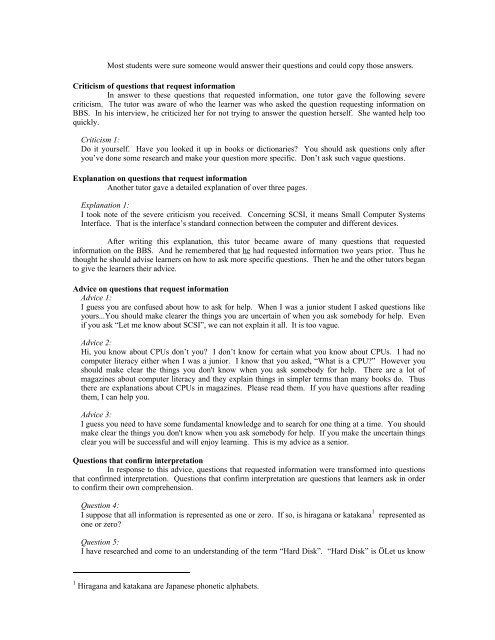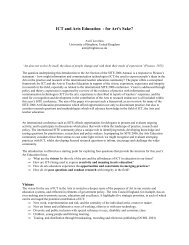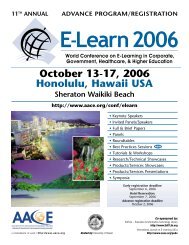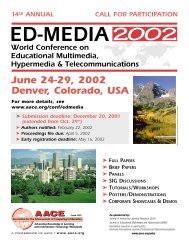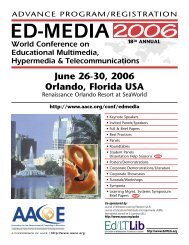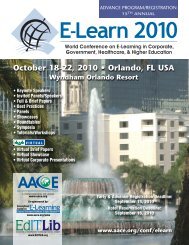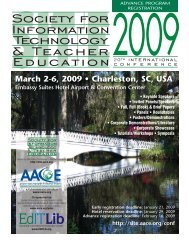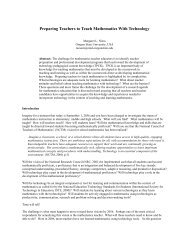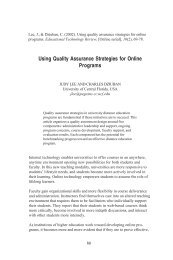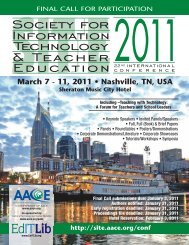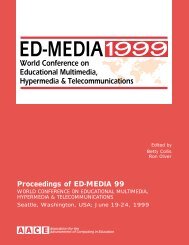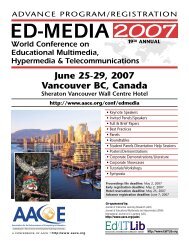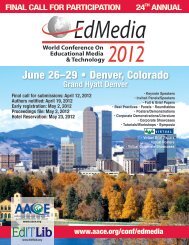ED-MEDIA 1999 Proceedings Book - Association for the ...
ED-MEDIA 1999 Proceedings Book - Association for the ...
ED-MEDIA 1999 Proceedings Book - Association for the ...
You also want an ePaper? Increase the reach of your titles
YUMPU automatically turns print PDFs into web optimized ePapers that Google loves.
Most students were sure someone would answer <strong>the</strong>ir questions and could copy those answers.<br />
Criticism of questions that request in<strong>for</strong>mation<br />
In answer to <strong>the</strong>se questions that requested in<strong>for</strong>mation, one tutor gave <strong>the</strong> following severe<br />
criticism. The tutor was aware of who <strong>the</strong> learner was who asked <strong>the</strong> question requesting in<strong>for</strong>mation on<br />
BBS. In his interview, he criticized her <strong>for</strong> not trying to answer <strong>the</strong> question herself. She wanted help too<br />
quickly.<br />
Criticism 1:<br />
Do it yourself. Have you looked it up in books or dictionaries You should ask questions only after<br />
you’ve done some research and make your question more specific. Don’t ask such vague questions.<br />
Explanation on questions that request in<strong>for</strong>mation<br />
Ano<strong>the</strong>r tutor gave a detailed explanation of over three pages.<br />
Explanation 1:<br />
I took note of <strong>the</strong> severe criticism you received. Concerning SCSI, it means Small Computer Systems<br />
Interface. That is <strong>the</strong> interface’s standard connection between <strong>the</strong> computer and different devices.<br />
After writing this explanation, this tutor became aware of many questions that requested<br />
in<strong>for</strong>mation on <strong>the</strong> BBS. And he remembered that he had requested in<strong>for</strong>mation two years prior. Thus he<br />
thought he should advise learners on how to ask more specific questions. Then he and <strong>the</strong> o<strong>the</strong>r tutors began<br />
to give <strong>the</strong> learners <strong>the</strong>ir advice.<br />
Advice on questions that request in<strong>for</strong>mation<br />
Advice 1:<br />
I guess you are confused about how to ask <strong>for</strong> help. When I was a junior student I asked questions like<br />
yours...You should make clearer <strong>the</strong> things you are uncertain of when you ask somebody <strong>for</strong> help. Even<br />
if you ask “Let me know about SCSI”, we can not explain it all. It is too vague.<br />
Advice 2:<br />
Hi, you know about CPUs don’t you I don’t know <strong>for</strong> certain what you know about CPUs. I had no<br />
computer literacy ei<strong>the</strong>r when I was a junior. I know that you asked, “What is a CPU” However you<br />
should make clear <strong>the</strong> things you don't know when you ask somebody <strong>for</strong> help. There are a lot of<br />
magazines about computer literacy and <strong>the</strong>y explain things in simpler terms than many books do. Thus<br />
<strong>the</strong>re are explanations about CPUs in magazines. Please read <strong>the</strong>m. If you have questions after reading<br />
<strong>the</strong>m, I can help you.<br />
Advice 3:<br />
I guess you need to have some fundamental knowledge and to search <strong>for</strong> one thing at a time. You should<br />
make clear <strong>the</strong> things you don't know when you ask somebody <strong>for</strong> help. If you make <strong>the</strong> uncertain things<br />
clear you will be successful and will enjoy learning. This is my advice as a senior.<br />
Questions that confirm interpretation<br />
In response to this advice, questions that requested in<strong>for</strong>mation were trans<strong>for</strong>med into questions<br />
that confirmed interpretation. Questions that confirm interpretation are questions that learners ask in order<br />
to confirm <strong>the</strong>ir own comprehension.<br />
Question 4:<br />
I suppose that all in<strong>for</strong>mation is represented as one or zero. If so, is hiragana or katakana 1<br />
one or zero<br />
represented as<br />
Question 5:<br />
I have researched and come to an understanding of <strong>the</strong> term “Hard Disk”. “Hard Disk” is ÖLet us know<br />
1 Hiragana and katakana are Japanese phonetic alphabets.


